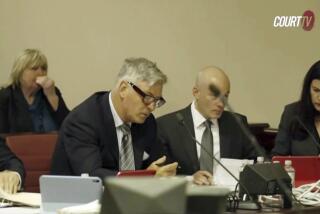Thompson saw wife slain, jury is told
- Share via
Assassins forced racing legend Mickey Thompson to watch his wife be murdered before he too was shot in the head execution-style, a prosecutor told jurors Monday, kicking off a trial in one of Southern California’s longest-running murder mysteries.
The man who ordered the chillingly vengeful 1988 killings was Michael Goodwin, a motor sports rival whose business had been destroyed in a bitter dispute with Thompson, Deputy Dist. Atty. Alan Jackson told jurors in Pasadena.
Goodwin’s lawyer, Deputy Public Defender Elena Saris, countered that the case had been overtaken and hopelessly obscured by repeated Hollywood treatments.
Saris sarcastically described the prosecution’s case: “The crime shows hate, Michael Goodwin hated Mickey Thompson, therefore Michael Goodwin committed the crime.”
Thompson and his wife, Trudy, were shot to death early on March 16, 1988, in the driveway of their estate in the gated community of Bradbury.
Witnesses said they saw two hooded men with guns flee; they were never caught.
“Once they were in a position where Mickey Thompson could clearly watch, the second gunman put a gun to her head and pulled the trigger,” Jackson said, citing neighbors’ recollections.
“Mickey Thompson’s last vision on Earth was of his wife being executed,” Jackson continued.
But Saris told jurors the state spent 18 years investigating the murder and still had not solved the case.
“This is naked suspicion,” Saris said. “After 18 years, we’re back at the same place we started.”
The courtroom of Los Angeles County Superior Court Judge Teri Schwartz was standing room only as lawyers, media representatives, photographers, relatives of the Thompsons and Goodwin’s friends sought seats. The trial is expected to last into December.
Goodwin has been in jail almost five years. He was first charged with murder in Orange County, but that case was dismissed after appeals judges found no evidence that the crime was planned there.
On Monday, Goodwin appeared in court clean-shaven with close-cropped hair, peering over reading glasses propped on his nose. He smiled at jurors as they filed back and forth within a yard of his chair.
Thompson was the first American to reach 400 mph in a piston-driven vehicle at the Bonneville Salt Flats. His name was used to sell many car products. He had already successfully promoted off-road races when he met Goodwin, who created supercross -- motorcycle racing on dirt tracks laid out in NFL stadiums. They joined to promote stadium motor sports in 1984, but within months, the two brash promoters had a falling-out.
What followed was a vicious court battle in which Thompson eventually won a $514,388 judgment against Goodwin.
The state Supreme Court confirmed the award in January 1988 -- two months before the slayings.
The keys to the prosecution are half a dozen witnesses who say they heard Goodwin threaten Thompson’s life because he was winning the fight for control of stadium racing at Southern California’s biggest venues.
The first witness on the stand Monday was William Wilson, former Pasadena police commander and general manager of the Rose Bowl and Jack Murphy Stadium in San Diego, who worked with Thompson and Goodwin.
At a dinner party at his San Diego County home, he heard Goodwin threaten Thompson with death, he testified.
“Thompson is destroying me, he’s taking everything I’ve got,” Wilson quoted Goodwin as saying as he looked across the courtroom at the defendant. “I’m gonna take him out.”
Wilson, who headed homicide investigations when he was an officer, said that when he heard about the Thompson killings, he immediately called Los Angeles homicide detectives.
Within six weeks, Goodwin had purchased a $400,000 yacht, bought $350,000 worth of gold coins and transferred $150,000 to an offshore bank account in the Caribbean -- although he claimed he was bankrupt, Jackson said.
Saris said Goodwin was not broke and therefore had no financial motive to kill; she said he had been constantly in contact with his lawyer, who told police he would return from an extended sailing trip through the Caribbean whenever he was called.
Saris described repeated TV treatments of the killings -- at least 10 productions on national broadcasts -- which continued to bring forth new witnesses as late as 2001. She said the shows had an invidious effect.
She urged jurors to reject “the Hollywood version of events -- generated by the media.”
She said no witness in 1988 ever said Thompson was forced to watch the murder of his wife.
“That didn’t come along until Hollywood got involved,” Saris said.
*
More to Read
Sign up for Essential California
The most important California stories and recommendations in your inbox every morning.
You may occasionally receive promotional content from the Los Angeles Times.












